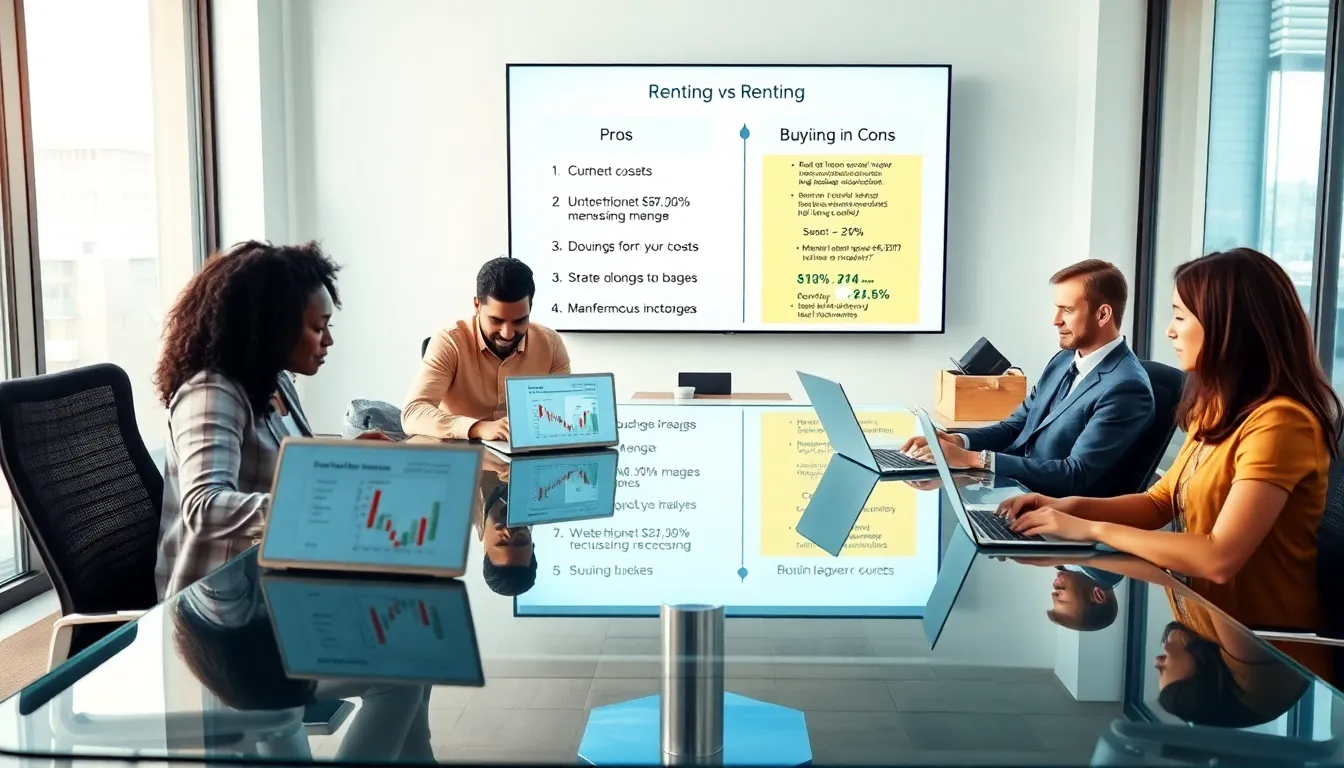Table of Contents
ToggleIn the great debate of renting versus buying, opinions run hot and heavy. It’s like trying to pick a favorite child, everyone has their bias. But what if we told you that both options have their merits? You might find yourself leaning toward one side or the other, depending on where you are in life. Whether you’re career-hopping like a professional athlete or looking to plant roots and grow, understanding the pros and cons can guide your decision. Let’s jump into the nitty-gritty and figure out which option might be your best bet.
Understanding Renting

Advantages of Renting
Renting offers a buffet of enticing perks. You can choose to create your ideal living situation without long-term commitments, a concept that sparks joy for many. One of the foremost advantages is the flexibility it provides. If the winds of life shift, be it a job opportunity across the country or a desire for a change of scenery, renting allows for easy relocation without the stress of selling a home.
Flexibility and Mobility
This leads us naturally to mobility. Renting offers the freedom to experience different neighborhoods, cities, or even states. Feeling adventurous? You can pack your bags and move within weeks or even days, depending on the lease. When your living situation is tethered to a property instead of a long-term mortgage, you live life on your terms.
Lower Upfront Costs
Let’s not forget about the wallet, renting typically requires fewer upfront costs compared to buying a home. Say goodbye to hefty down payments. Generally, all renters need to provide is a security deposit and possibly the first month’s rent. This is a considerable relief, especially for those just starting their careers or those who have other financial obligations.
Maintenance Responsibilities
Maintenance responsibilities are another feather in the renting cap. Imagine not having to deal with pesky plumbing issues or roof repairs. Those responsibilities usually fall on the landlord, not the tenant. As a renter, the biggest worry may just be if the Wi-Fi is functioning, leaving room to focus on life’s bigger dilemmas.
Drawbacks of Renting
But remember, all that glitters isn’t gold. Renting does have its drawbacks. The most glaring is the lack of equity building. Every dollar spent on rent is a dollar not invested in your future or your own property.
Lack of Equity Building
Many renters wonder: where does all that money go? Essentially, it’s a hefty bill to secure your living space without building ownership. Long-term, this can feel like a disadvantage compared to homeownership where payments contribute to equity.
Restricted Customization
Also, renters often find themselves stuck within the confines of what their landlord allows. Want to knock down a wall for an open concept? Good luck convincing your landlord. This restriction can feel stifling for those who enjoy adding personal flair to their living environments.
Rent Increases and Stability Issues
Finally, rent increases can be unpredictable, creating a roller coaster of uncertainty. You may adore your apartment one year, then receive a notice that rent is going up, maybe for no other reason than the landlord’s desire to keep up with market trends. This instability can lead to anxiety, especially when budgeting for the year ahead.
Overview of Buying
Advantages of Buying
Now, let’s switch gears and discover the realm of home buying. Surprisingly, homeownership is often viewed as a rite of passage, a solid mark of adulthood. The key advantages include building equity, investment potential, and customizable living spaces. For many, having a stake in something tangible is the essence of what it means to truly be home.
Equity and Investment Potential
First off, let’s talk equity. Every mortgage payment gradually builds your equity, potentially translating into thousands of dollars in profit when the time comes to sell the property. When you’re paying a mortgage instead of rent, you’re actively investing in your future.
Customization Freedom
Then there’s customization. As a homeowner, your options are virtually limitless. Want to paint the walls neon pink? Go for it. Feel like adding a luxurious sunroom or even a garden? The choice is entirely yours. The limits of design are set only by your imagination and budget.
Stability and Long-Term Security
Homeownership also provides stability. With a fixed-rate mortgage, you know exactly what your payments will be every month. Say goodbye to unexpected rent spikes. Stability can lead to comfort and peace of mind, knowing this space is yours for the long haul.
Drawbacks of Buying
But, buying comes with its challenges. The first hurdle is the higher upfront costs involved in purchasing a home, think down payments, closing costs, inspections, and more. It’s a financial commitment that can overwhelm the unprepared.
Higher Upfront Costs
Generally, a down payment can vary from 3 to 20 percent of the home’s purchase price. Add in other costs, and it can be an intimidating figure for many. This upfront burden can deter many potential buyers from diving into the market.
Ongoing Maintenance and Repairs
Let’s not overlook ongoing maintenance. Owning a home means managing repairs, lawn care, and other upkeep duties that can consume time and money. Picture yourself becoming a weekend warrior, battling with home projects or hiring contractors just to keep the property in decent shape.
Market Risk and Depreciation
Finally, the aspect of market risk rears its head. Unlike renting, where you don’t gain or lose value, homeowners face the reality of property depreciation. Market fluctuations can dictate your home’s worth and, if it dips, you may find yourself in a less-than-favorable situation when it comes time to sell.
Making the Decision: Renting or Buying?
Financial Considerations
Now that both sides have been explored, how do you make the final decision? Financial considerations are paramount. Renters should assess their budget and determine if they can comfortably transition into homeownership. First-time buyers may need to evaluate their debts, potential down payment savings, and long-term earning potential.
Personal Lifestyle Factors
Consider personal lifestyle factors as well. Are they someone who enjoys the freedom of moving around, or do they yearn for stability? Understanding one’s lifestyle can that crucially shape their housing decision.
Future Goals and Plans
Future goals and plans are equally vital in making this decision. Those with aspirations for traveling or changing job locations may prefer the fluidity renting provides. On the other hand, those looking to settle down and start a family may feel more inclined to buy a home.







